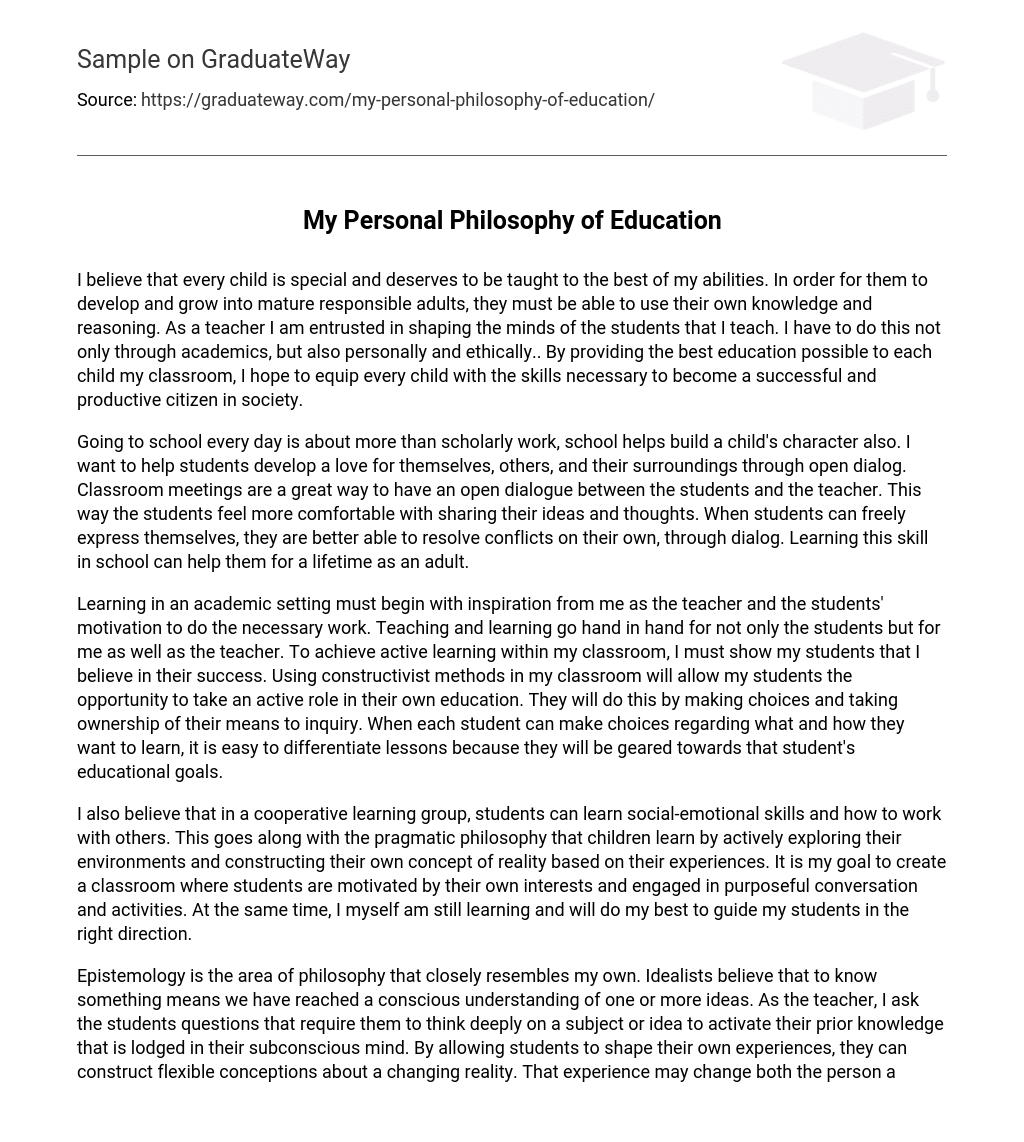I believe that every child is special and deserves to be taught to the best of my abilities. In order for them to develop and grow into mature responsible adults, they must be able to use their own knowledge and reasoning. As a teacher I am entrusted in shaping the minds of the students that I teach. I have to do this not only through academics, but also personally and ethically.. By providing the best education possible to each child my classroom, I hope to equip every child with the skills necessary to become a successful and productive citizen in society.
Going to school every day is about more than scholarly work, school helps build a child’s character also. I want to help students develop a love for themselves, others, and their surroundings through open dialog. Classroom meetings are a great way to have an open dialogue between the students and the teacher. This way the students feel more comfortable with sharing their ideas and thoughts. When students can freely express themselves, they are better able to resolve conflicts on their own, through dialog. Learning this skill in school can help them for a lifetime as an adult.
Learning in an academic setting must begin with inspiration from me as the teacher and the students’ motivation to do the necessary work. Teaching and learning go hand in hand for not only the students but for me as well as the teacher. To achieve active learning within my classroom, I must show my students that I believe in their success. Using constructivist methods in my classroom will allow my students the opportunity to take an active role in their own education. They will do this by making choices and taking ownership of their means to inquiry. When each student can make choices regarding what and how they want to learn, it is easy to differentiate lessons because they will be geared towards that student’s educational goals.
I also believe that in a cooperative learning group, students can learn social-emotional skills and how to work with others. This goes along with the pragmatic philosophy that children learn by actively exploring their environments and constructing their own concept of reality based on their experiences. It is my goal to create a classroom where students are motivated by their own interests and engaged in purposeful conversation and activities. At the same time, I myself am still learning and will do my best to guide my students in the right direction.
Epistemology is the area of philosophy that closely resembles my own. Idealists believe that to know something means we have reached a conscious understanding of one or more ideas. As the teacher, I ask the students questions that require them to think deeply on a subject or idea to activate their prior knowledge that is lodged in their subconscious mind. By allowing students to shape their own experiences, they can construct flexible conceptions about a changing reality. That experience may change both the person and the environment.
The pragmatic axiology is also culturally relative. We all know that classrooms can be made up of many ethnicities and cultures and through this philosophy we can see and appreciate different cultures and values. Pragmatists dismiss the idealists and realists’ theories that values are universal and absolute. Anything that contributes to a person’s personal growth is valuable. Values can change by testing them and redefining them through our experiences.
When teaching students of other cultures and ethnicities, it is always important to incorporate their culture somehow into the lesson. This way the student feels that their way of doing things is also important. It allows for an opportunity for the other students in the class to learn firsthand about cultures that they may have otherwise known nothing about. They can see how in some ways their cultures may be similar or different and learn to respect those differences.
As the teacher, it is my job to facilitate these learning experiences with my students. Through interdisciplinary education, you can take one situation and its outcome and apply it to similar situations. I view school as a community of diverse learners, where we can learn and teach one another. A pragmatic classroom is one that provides experiences that encourage students of other cultures to appreciate cultures other than their own.
For me, I get great joy from watching my students learn new things day by day. Watching a student’s face light up when they are having fun while learning new and exciting things are my rewards as a teacher. Knowing that I was a part of that new discovery as well, makes me feel like my purpose as a teacher is complete. Children need a strong, and compassionate educator to help pave the way for their success and I will always strive for my best in doing just that.





